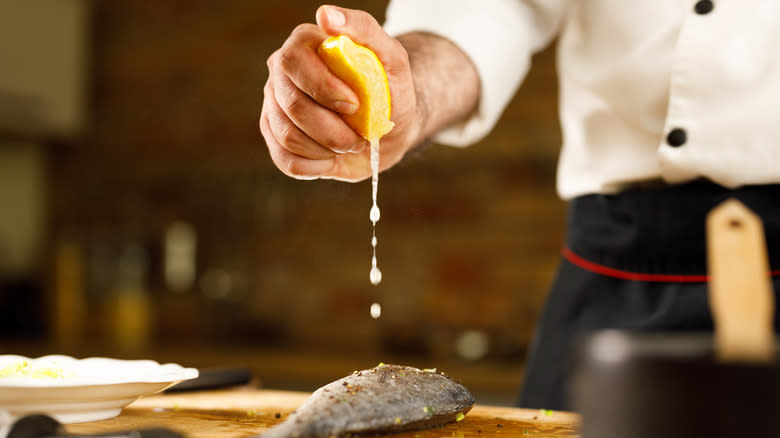The Acid Hack For Bringing Basically Any Bland Food Back To Life

Have you ever been so excited to try out a new recipe, only for it to end up tasting... off in some way? Maybe you're attempting to recreate an amazing meal you enjoyed at a restaurant, or you're hoping to add your own twist on a family dish. No matter what you're whipping up in the kitchen, it can be disappointing when the end result just lacks that burst of flavor you expected. When this happens, many chefs will advise that all you need is a pinch of salt to come to the rescue and give your dish that extra "oomph." But sometimes, not even a generous sprinkle of salt can come to the rescue. When your food tastes extra bland, there are options to add sauces and condiments that promise to brighten it up –- but a dollop of ranch or hot sauce won't always compliment the recipe you're putting together, so it's hard to rely on such distinctly-flavored additions.
When seeking to revive an underwhelming flavor profile, you may want to turn to ingredients containing acid. After all, cooking is in many ways a form of science as different ingredients combine, react, and change forms. A few drops of acidity in the form of lemon juice or vinegar might be all you need to enhance a dull dish.
Read more: French Cooking Tricks You Need In Your Life
A Touch Of Acidity Makes All The Difference

Before you start to worry, the answer is no: adding a touch of acid won't transform your sweet or savory dish into a sour one. In fact, it's the lack of acidity that is usually the culprit for underwhelming dishes. Acidity brings food to life by balancing the powerful flavors in your recipe. When you add a little acidity to a bland cut of meat or a sauce that's a little too sweet, the contrasting flavors will practically dance on your taste buds.
As previously mentioned, the two heavy hitters when it comes to adding acidity are lemons and vinegar. Adding a touch of lemon — either juice, zest, or both — is an extremely popular way of brightening up a dish. Meat such as chicken and fish can be enhanced with a few slices of lemons placed on top before cooking. You can also use other types of citrus like oranges, or go for limes instead of lemons depending on your particular cuisine. Limes are commonly used to cut through dishes with a spicy profile, while oranges can subdue extra sweet kitchen creations.
Vinegar can be used similarly; while the ingredient has an overpowering flavor, a small amount combined with a bland dish will breathe new life into your recipe. White vinegar can be too sharp, while apple cider vinegar or white wine vinegar can be better choices for these meal-saving moments.
Ingredients You Might Not Have Known Could Add An Extra Kick To Your Recipe

Lemon juice and vinegar are common staples that just about every kitchen has lying around, but just in case you're all out of these acidic ingredients, there are other ways to add an extra pop of flavor to your meal. Tomatoes, for example, are a welcomed addition to many dishes that cannot be revived with a dash of salt. Regardless of its form: juice, paste, sauce, or even sundried, tomatoes are a great source of acidity that compliments many savory flavors without becoming too overpowering.
If tomatoes aren't to your liking, consider turning to dairy. While some dairy products like heavy cream can contribute to bland food, the fat and acidity in products like sour cream and yogurt are often used to enhance a dull dish. When combating blandness, one Redditor shared that a chef's focus should be on the salt content, followed by the acidity, and then the fat content. The user explained that fat often binds to seasonings in a dish and "carries the flavor to your tongue." While experimenting with new ingredients, have patience and remember that all delicious things take time.
Read the original article on Daily Meal.
